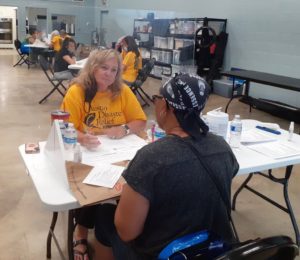
By: Greta Sharp
As a newcomer to Crisis Incident Stress Management, or CISM, I’ve been reflecting on lessons learned from using this approach with others. I am task-oriented and struggle to prioritize people above the task. CISM has been a valuable tool and game changer for me in this area.
A notable experience was this past summer during my internship with Austin Disaster Relief Network in Austin, Texas. As part of a COVID-19 outreach, our organization gave Visa gift cards to community members in need. The cards could be used for food or gas. I helped with two intake sessions for survivors and distributed the number of gift cards based on each family’s situation.
Prior to CISM training, I would have focused on meeting with as many individuals as possible during my 3-hour intake session. With the training, I concentrated on the person in front of me and listened, really listened, to what they communicated verbally and nonverbally. “Tell me about your life before COVID and now?” I asked. It was a good feeling to settle in, ignore my watch, and give my full attention to the survivor.
One person who was eager to talk was John. He seemed relieved to get to tell me his story. “Before COVID, I was a paid worker at the big food bank in town. I was like you, helping others. I never thought I’d be on this side of the table. Then I fell off a ladder and broke my hand in February just before everything shut down. I was laid off and haven’t been able to get any work since then.”
As we proceeded through the CISM questions, John seemed to come alive. He sat up straighter and became animated in his conversation. A weight had been lifted! He realized that his situation and response were things that others were experiencing too. Our time together was much more valuable than the VISA card amounts I signed over that day. Something shifted in John, and something shifted in me. It was satisfying to listen to John, and it was such a privilege to hear and receive his story. More satisfying, in fact, than to efficiently move him through my station like a number.
CISM has also positively influenced my relationships with my adult children. Taylor, my son, lives and works abroad. We rely on phone calls to catch up every week or two. Recently he had a significant conflict at his workplace. Since I had previously worked for the same company at the same location, my “pre-CISM trained self” would have interrupted Taylor’s retelling of events and immediately given advice. Instead, I listened and asked some of the CISM questions that best fit the situation.
Although this was not a traumatic event, the basic principles of CISM were easily applied. I felt myself internally slow down and relax as the conversation unfolded. I enjoyed the art of listening. Although we did brainstorm some responses, the conversation was more than just me giving advice.
So what lessons have I learned from CISM?
In the end, everyone benefits.